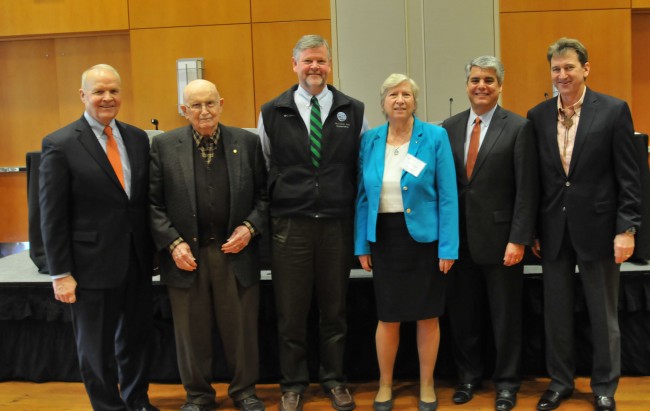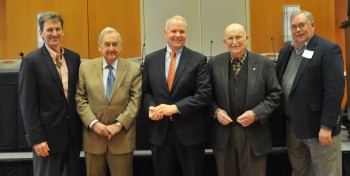Commemorating a Decade of Excellence and looking to the future
February 8, 2016

When Jack and Katie Jackson made the decision to invest their fortune in The University of Texas at Austin, they envisioned the creation of a world-class school of geosciences to help solve problems important to Texas and the world.
Their vision guided a 10-year anniversary research symposium hosted by the Jackson School on Jan.22, 2016, with research panels organized around the geoscience topics Jack specifically listed in the letter making his decision official: geology; geophysics; energy, mineral and water resources; and broad areas of Earth sciences including the environment.
While the event commemorated a decade of accomplishments at the school, the discussions that filled the day focused on the future.
“As we celebrate our 10th anniversary, I think it’s only fitting that we look toward the future,” said Dean Sharon Mosher at the event welcoming. “The future of the geosciences, the grand challenges that face society in the future, and of course, the role that the Jackson School could play in helping explore and solve these grand challenges.”
The daylong symposium was attended by the Jackson School community and guests from around the country. Each panel was comprised of researchers, professors and graduate students and was kicked off by a short lecture by a distinguished speaker. The speaker for each panel was as follows:
- Energy, Mineral and Water Resources: Steve Koonin, founding director of NYU’s Center for Urban Science and Progress and former Under Secretary of Energy
- Geophysics: Mark Zoback, director of Stanford University’s Natural Gas Initiative
- Geology: George Davis, Geological Society of America past president, provost emeritus and professor emeritus of structural geology at University of Arizona, and alumnus of The University of Texas at Austin
- Broad Areas of the Earth Sciences Including the Environment: Marilu Hastings, Vice President of Sustainability Programs for the Cynthia and George Mitchell Foundation.
In addition to these speakers, Greg Fenves, the president of The University of Texas at Austin and a former earthquake engineer, delivered remarks at the event.
“I only work in the top 30 feet. You guys go a lot deeper and have a lot deeper knowledge about geoscience than I do,” he quipped.
In his talk, he mentioned the importance of geology as a basic science, as well as a profession, and how the gift of Jack and Katie Jackson jumpstarted geoscience research by uniting its three geological research units—The Department of Geological Sciences, the Institute for Geophysics, and the Bureau of Economic Geology – as the Jackson School.

“My vision for the university is really built on interdisciplinary collaboration…and I think that was the founding idea in bringing together these three units together at the Jackson School,” Fenves said.
The importance of interdisciplinary collaboration was also brought up across the panels. The Jackson School’s emphasis on fostering it, adopting new technology, and supporting student research at all levels was lauded as a way to help understand—and solve—grand challenge problems in geosciences.
“We need to produce the next generation of geoscientists and solve the problems of the 21st century,” Mosher said, giving an overview of the panels toward the end of day. “We need to do what we do, which is blend the study of the geologic record with the modern day. Because only by looking at the short and long-term processes can we really forecast what’s going to happen in the future.”
In addition to the scientific panels, the symposium included a special panel called “The Jackson Five” dedicated to remembering Jack and reflecting on his influence on the school today. It consisted of five people who were close to Jack Jackson later in life and helped secure his estate for the university. They were Larry Faulkner, former president of UT Austin; Peter Flawn, Emeritus, former president of UT Austin; Bill Fisher, the Jackson School’s inaugural dean and the Leonidas T. Barrow Centennial Chair in Mineral Resources; James Langham, Jackson’s longtime financial advisor and executor of his estate; and Scott Tinker, director of the Jackson School’s Bureau of Economic Geology.
“These words that we’re following today are partly Jack’s words and the vision he had for science, integration and what he wanted to invest in,” said Tinker. “I think that’s an important piece. He’s not just someone who gave money, he actually had a vision for how it would play out.”
The group reminisced about Jack Jackson and his many years on the Geology Foundation. Jackson, who made his fortune in the gas fields of Wise County and later in Dallas real estate, and wife Katie, were longtime philanthropists who gave generously to education, health care and other issues they cared about. Katie died in 2001. Jack, in 2002, made the decision to leave their estate to The University of Texas at Austin after his death. The estate was conservatively estimated to be worth $150 to $200 million at the time of Jack’s decision. The endowment is now valued at more than $300 million.
Although Jack had been on the university’s Geology Foundation since 1975 and given generously to the school, his decision to give the remainder of the estate to the university came together quickly, the panelists explained.
“That was 84 days in the making,” Fisher said. “It went from what’s next? To that was it! And we had a school in about 84 days.”
The closing speaker for the symposium was Chuck Williamson, chairman of Weyerhaeuser and member of the Jackson School’s advisory council. He ended the event by emphasizing the importance of geoscience research, talking about it, and directing it toward problems that affect the whole world.
“To me, what’s important in the geoscience right now is we have to stay in the conversation. I don’t care if it’s with public policy makers or your neighbors,” Williamson said. “In order for the Earth sciences to keep its importance and its relevancy all the research you heard about today has to be aimed at grand challenges and things that are societally relevant, and I think we heard that from every panel today.”
